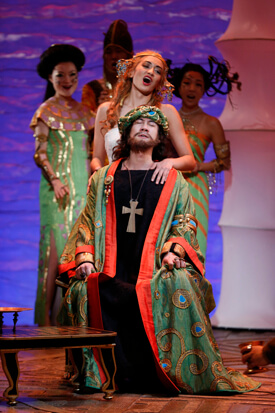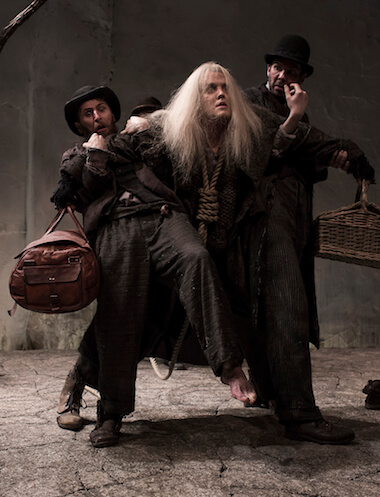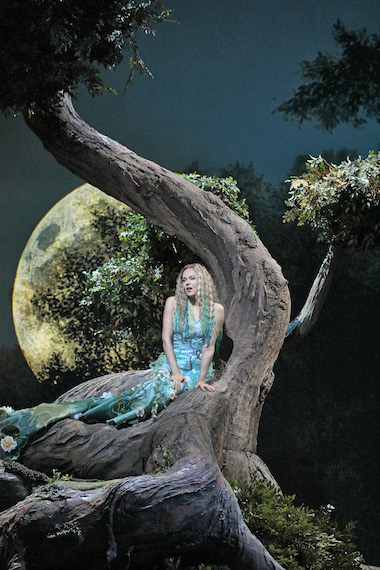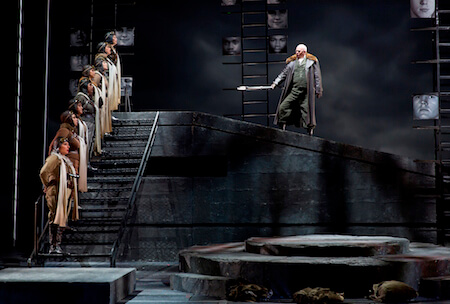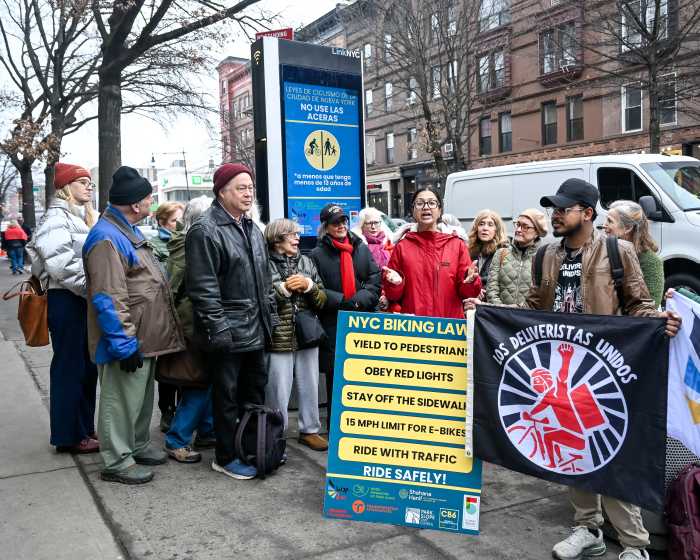Yunpeng Wang and Leela Subramaniam in the Manhattan School of Music Opera Theater’s production of “Thaïs.” | CAROL ROSEGG
Concert opera leavens New York’s repertory in salutary ways. The Collegiate Chorale’s December 5 mounting of Vincenzo Bellini’s penultimate work, “Beatrice di Tenda,” was a worthwhile and interesting endeavor, if uneven in its execution. “Beatrice,” not top-flight Bellini either musically or dramatically, deserves trotting out from time to time for some of its well-crafted ensembles.
The evening’s most impressive work came from mezzo Jamie Barton, with a rich, imposing tone. She sounded a bit hard-pressed on a few high notes — Agnese is really a soprano role — but otherwise drew her lines in long, meaningful ways and with much expressive feeling.
Such feeling went notably lacking in the first act contributions of nominal star Angela Meade, a gifted but often interpretively blank, unspecific singer. Meade encompassed the music with considerable accomplishment, but the tone sometimes lacked focus and there was little sense of emotional involvement or expressive shaping of phrases. Matters improved somewhat in the second part, where Meade uttered the text more incisively and deployed a wider dynamic palette. Despite the now de rigueur diva-worthy cheers that greeted her testing final scene, she has substantial work to do to become a real artist — as opposed to a well-stocked vocalist.
Michael Spyres is certainly already an estimable bel canto stylist with well-pronounced Italian, but Orombello’s part gave him little to do in the register extremes that are his particular specialties. Baritone Nicholas Pallesen showed excellent line and mellow if somewhat light timbre in the cantilena passages of Filippo, the only character with any trace of development. On book, seemingly sight-reading recit passages, however, he might as well not have been onstage at all; concert opera calls for strong presence maybe even more than staged work.
The chorus itself was in healthy voice. I’ve heard James Bagwell do well conducting smaller forces but this was not a very distinguished showing, with little inflection of tempo or phrasing. Frequently, his American Symphony players were just plain too loud for the singers, and the score was significantly cut.
Manhattan School of Music scored substantially with its “Thaïs” (December 9), utilizing the pre-existing colorful, well-imagined settings and costumes by André Barbe. As in previous outings (St. Louis, Montreal, Boston), Renaud Doucet directed. Working with him and the deft conductor George Manahan seems to have buoyed the student forces, as this was a very fine performance, both fun and moving — two adjectives not evoked by the Met’s leaden 2008 effort.
It really helped to have young protagonists. Leela Subramaniam and Yunpeng Wang, looking plausibly combustible, both used suitably fresh and elastic voices in stylish, musically informed ways. At the end, Thaïs died in a white dress, imagining herself borne upward — a far better solution than the Met’s having Renee Fleming transmogrified into a likeness of the Empress Theodora.
Aaron Short furnished an alert, pleasing-voiced Nicias, and smaller roles were especially well-taken by Elena Perroni (Crobyle), Elsa Quéron (Myrtale), and Clarissa Parrish (Albine). The level of comprehensible French diction reflected credit on Cristina Stanescu’s coaching. Bravi tuttti!
The Met’s “Aida” December 12 was most notable for Liudmyla Monastyrska’s luminous vocalism in the title role. The Ukrainian soprano doesn’t offer much in the way of verbal bite or facial mobility, but she has the goods — a dynamically flexible, beautifully soaring sound — in this tough role, ill-served hereabouts since the 1980s showcased Leontyne Price, Anna Tomowa-Sintow, and Aprile Millo.
Roberto Alagna — no kind of Radames in terms of vocal weight, but not without some latinate virtues — offered strolling waiter manners and too much evidence of crooning and straining. Olga Borodina managed to pull off Amneris, but the top is becoming alarmingly ragged — she eventually had to leave out some of “Voi la terra.” George Gagnidze made a very solid, conventional Amonasro, while the two basses (Stefan Kocan and Miklos Sebestyen) were embarrassingly provincial. The gifted Alexei Ratmansky provided trivial dances. Fabio Luisi conducted with high competence in a manner best described as objective.
The next night, Luisi held everything together for “Les Troyens,” but the phrases had little distinctive shape and there was no special sense of overall architecture. Berlioz’s music is terrific, and the chorus did it justice. Sadly, the vocal performances of Deborah Voigt and Marcello Giordani were largely inadequate; he rallied a bit in the magical fourth act, finding a bit of liquidity in what has become a fixed, choked tone.
Susan Graham, always sympathetic, lacks the grandiose vocal and dramatic scope for Didon. When she “went for it,” she pushed off the note or did some screamy declamation. Yet much of her soft singing was enjoyable, and she understands French style. Dwayne Croft — a fully qualified Chorebe — had an announced cold.
The really impressive singing came from Karen Cargill (Anna), Eric Cutler (Iopas), and Paul Appleby (Hylas), though Francesca Zambello has altered the once-breathtaking staging of Hylas’ scene to resemble a Broadway second lead’s big moment, having him come forward singing full out to the audience.
Zambello has made several changes, presumably for the January 5 HD broadcast. Some are clever. Another — having the silent Andromache scream not once but twice — is disastrous, violating some of Berlioz’s most expressive music. Odds are this show will improve. If you’ve never seen the colossal “Troyens,” the HD broadcast offers an inexpensive opportunity to hear an elusive masterpiece of jaw-dropping power and beauty.
On December 14, seasoned choral conductor Harold Rosenbaum led his Canticum Novum Singers — the women fresher and more precise than the men, the opposite of the Met chorus — in Bach’s splendid “Christmas Oratorio” at the Church of St. Jean Baptiste. The church’s acoustics didn’t flatter the Artemis Chamber Ensemble’s collective string tone, but gave the trumpets, timpani, and oboes a field day.
Soprano Katherine Wessinger, merely correct at first, bloomed in Part Two. The standout was the Met’s Anthony Roth Costanzo, bringing to his first Bach assignment luminous sound and expert ornaments, plus showing — in both recitative and cantilena — a wonderful play of dynamics within sculpted phrases. Jesse Blumberg sang with skill and attractive baritone timbre and, as always, great communicativeness.
Despite some rough edges, this was a very enjoyable concert. On May 18, Rosenbaum’s forces tackle an intriguing Mozart/ Salieri program involving rising mezzo Jennifer Johnson Cano and a fine tenor we hear far too little of locally — Frank Lopardo.
David Shengold (shengold@yahoo.com) writes about opera for many venues.

